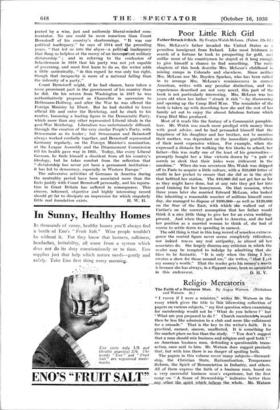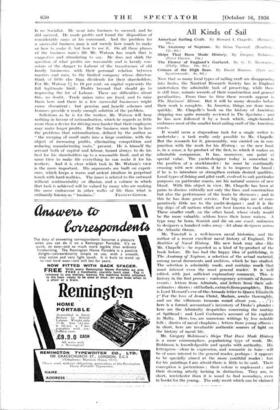Religio- Mercatoris
"I TRINE if I were a minister, writes Mr. Watson in the essay which gives the title io'ihi.ileferesting collection of papers on various subjects, "my first question when examining for membership would not be 'What do you believe?' but 'What are you prepared to do ? ' Church memberslin would then be less like admission to a club and more like enlistment for a crusade." That is the key to the writer's faith. It is practical, earnest, sincere, unaffected. ft is something for the market-place no less than the study. "You don't suggest that a man should mix business and religion and spoil both ? " an American business man, defending a questionable trans- action, once said to him. Mr. Watson does suggest precisely that, but with him there is no danger of spoiling both.
The papers in this volume cover -many subjects—Steward- ship, the Christian State, Rationalisation, Temperance Reform, the Spirit of Renunciation in Industry, and others. of them express the faith of a business man, based on - ; --RILYieL.thg- Yth.ok• %%taw is no Socialist. He went into business to succeed, and he did succeed. He made profits and found the disposition of considerable sums at his command. And the 'problem for a successful business Alan is -not merely linw- much-to:make or how to make it, but how to use it.. On all these phases of the business man's- life Mr. -Watson- has much- that is suggestive and stimulating to say. He does not shirk the question of what profits are reasonable and is keenly Con- scious of the danger to Labour of the transference of old family businesses, with their- personal _relation between masters and men, to the limited company whose directors think of little eLse than_ dividends for their 'shareholders. For Mr. Watson 71 to 10 per cent, on capital represents the full legitimate limit:- Profits beyond that 'should go to improving the lot of Labour. There are difficulties about this, no doubt.. Trade union rates are fixed, and to raise them here and there in -a few successful businesses Might cause discontent ; but pension and ,benefit .schemes and bonuses provide a ready enough solutian of the'problern.
Solicitous as he is for the worker, Mr. 'Watson Will hear nothing in favour of rationalisation, which he regards as little more than a device for driving men harder that their employers may make larger profits. But the 'business man- has to face the problems that rationalisation, defined by the author as "the merging of small units into a large' .Combine,- with the object of increasing profits, eliminating . competition and reducing manufacturing Costs," present. He is himself the servant both of capital and labour,-bmind always to jo his best for his shareholders up to a reasonable limit, and at the same time to make life everything he can make it for his workers. And it is clear whith task In -Mr. Watson's view is the more important. His arguments are built on experi- ence, which keeps a warm and ardent idealism in perpetual touch with hard realities. The inner is related to the outward without sentimentality or illusion, and a volume in which that task is achieved will be valued by many who are making the same endeavour in „other, walks of life, than what is ordinarily known-as `.'-business.7' - FRANCIS GOWER.





















































 Previous page
Previous page